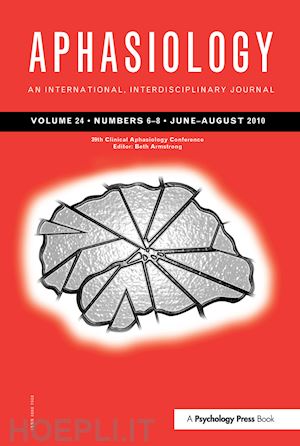R. Cameron, J. Wambaugh,S. Mauszycki, Individual Variability on Discourse Measures over Repeated Sampling Times in Persons with Aphasia. A. Ferguson, L. Worrall, B. Davidson, D. Hersh, T. Howe,S. Sherratt, Describing the Experience of Aphasia Rehabilitation Through Metaphor. G. Olness, S. Matteson,C. Stewart, "Let Me Tell You the Point": How Speakers with Aphasia Assign Prominence to Information in Narratives. J. Stark, Content Analysis of the Fairy Tale Cinderella – A Longitudinal Single Case Study of Narrative Production: ‘From Rags to Riches’. M. Kirmess,L. Maher, Constraint Induced Language Therapy in Early Aphasia Rehabilitation. J. Kurland, K. Baldwin,C. Tauer, Treatment-Induced Neuroplasticity Following Intensive Naming Therapy in a Case of Chronic Wernicke’s Aphasia. S. Christensen,H. Harris Wright, Verbal and Non-Verbal Working Memory in Aphasia: What Three N-Back Tasks Reveal. J-A. Silkes,M. Rogers, Perception of Visually Masked Stimuli by Individuals with Aphasia: A methodological Assessment and Preliminary Theoretical Implications. M. Hough, Melodic Intonation Therapy and Aphasia: Another Variation on a Theme. M. Dickey,H. Yoo, Predicting Outcomes for Linguistically-specific Sentence Treatment Protocols. E. Riley,C. Thompson, Semantic Typicality Effects in Acquired Dyslexia: Evidence for Semantic Impairment in Deep Dyslexia. J. Wambaugh,S. Mauszycki, Sound Production Treatment: Application with Severe Apraxia of Speech. W. Katz, M. McNeil, D. Garst, Treating Apraxia of Speech (AOS) with EMA-supplied Visual Augmented Feedback. S. Mauszycki, J. Wambaugh,R. Cameron, Variability in Apraxia of Speech: Perceptual Analysis of Monosyllabic Word Productions Across Repeated Sampling Times. B.MacWhinney, D. Fromm, A. Holland, M. Forbes,H. Harris Wright, Automated Analysis of the Cinderella Story. R. Wilkinson, K. Bryan, S. Lock,K. Sage, Implementing and Evaluating Aphasia Therapy Targeted at Couples’ Conversations: A Single Case Study. J.A. Hengst, M.C. Duff, A. Dettmer, Rethinking Repetition in Therapy: Repeated Engagement as the Social Ground of Learning. C. Vickers, Social Networks After the Onset of Aphasia: The Impact of Aphasia Group Aattendance. L. Togher, E. Power, R. Tate, S. McDonald,R. Rietdijk, Measuring the Social Interactions of People with Traumatic Brain Injury (TBI) and their Communication Partners: The Adapted Kagan Scales. L. Murray, Distinguishing Clinical Depression from Early Alzheimer’s Disease in the Elderly: Can Narrative Analysis Help? W. Leng Chue, M. Rose,K. Swinburn, The Reliability of the Communication Disability Profile: A Patient Reported Outcome Measure for Aphasia. T. Cranfill,H. Harris Wright, Importance of Health-related Quality of Life for Persons with Aphasia, Their Significant Others, and SLPs: Who Do We Ask?











